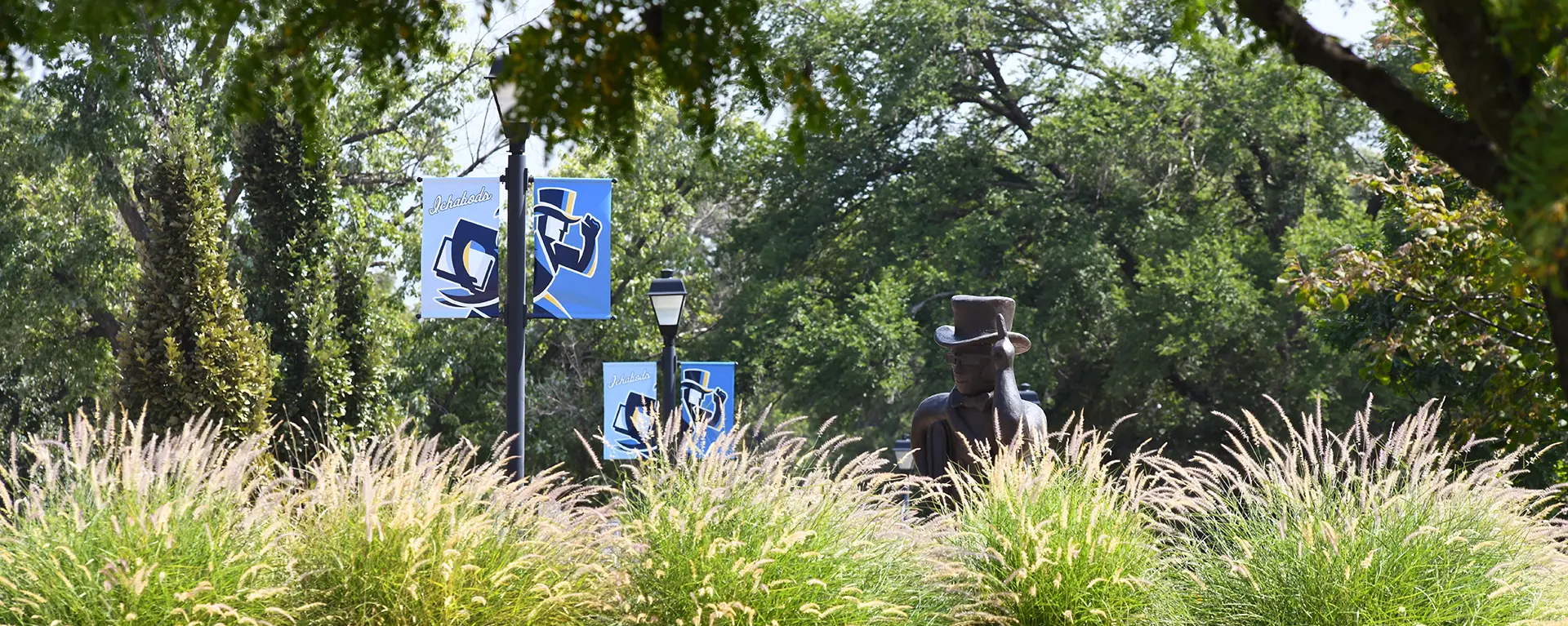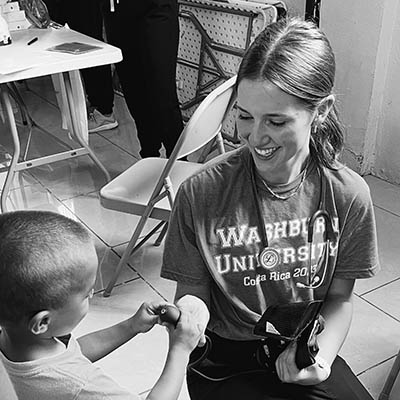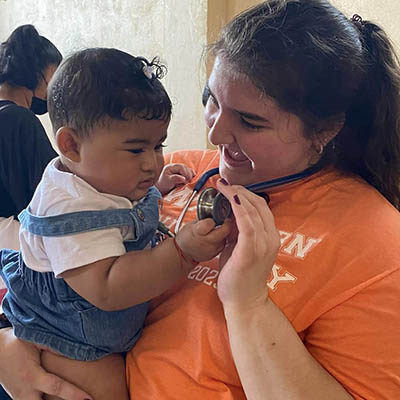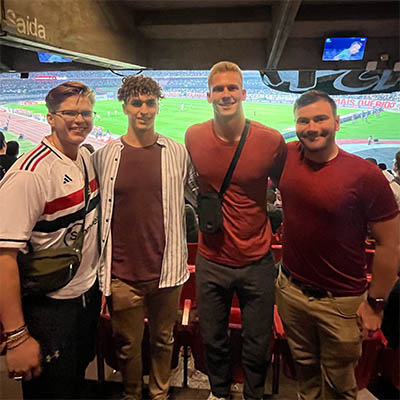

Elsa Cozine, 1st Place
Health Care Perspectives in Central America: Costa Rica (Faculty-led) - Winter Break 2023
The people of Costa Rica will forever have my heart. They are a people unlike any other. Many are refugees from nearby Nicaragua and come from nothing. They have little to no belongings in their scrap-metal homes that stand unevenly on the mountainside, yet they have everything. They have a joy unmatched. They have a gratefulness never before seen in the United States. They have a contentment in the face of many uncertainties, including wondering if they will even have enough food to put on the table to feed their children for dinner that night.
If we all lived how the people in Costa Rica lived, we would be a more loving, open-armed, family like community. While there is poverty, crime, child slavery, and other forms of brokenness present in the country, there is a hope that can be felt throughout the people and the land.
Setting up our health clinics around various communities, welcoming people of all ages in to be seen, and caring for their health concerns and needs was the role we nursing students had while in Costa Rica. All we had to do was say yes. Yes to getting on the plane that flew us to Costa Rica. Yes to eating beans and rice in various forms for every meal. Yes to riding on a packed-full bus through many windy mountain roads. Yes to setting up the clinics. Yes to checking vital signs, inspecting different body systems, and asking health-based questions. Yes to stumbling through our broken Spanish and their broken English to have a simple conversation. There were a thousand yeses on our part. It might seem as though it was a lot of work.
However, every yes we chose to say for each aspect of the trip made the difference in the lives of every person we saw. While we did go to Costa Rica eager to learn, serve, and help our new friends, we all came back with much more than what we brought. I am not talking about all the souvenirs we brought back. No, I am talking about what we learned from the people of Costa Rica: the newfound urgency to love others and serve them accordingly in and out of the healthcare setting every day. May I forever remember the love and gratitude of the Costa Ricans we helped and remember to always reciprocate that to those whom I encounter.

Breuana DuVal, 2nd Place
Health Care Perspectives in Central America: Costa Rica (Faculty-led) - Winter Break 2023
Costa Rica is warm and sunny country with a vibrant culture. Known for its diverse nature with an abundance of sloths, orchids, and waterfalls it is no doubt that Costa Rica is one of the most beautiful places on earth. These qualities Costa Rica a popular tourist destination, especially over the winter when tourists are wanting to escape cold weather and experience pura vida living. However, this study abroad experience was far removed from the glamour and attractiveness of tourist destinations. Throughout my stay in Costa Rica, I was completely immersed into the culture of the Costa Ricans, and recognized how different a country’s healthcare system could be. Each community we visited held many different eye-opening experiences. The first community that our group visited was La Carpio, one of two scavenger communities where we saw Costa Ricans for healthcare assessments. Central American Mission Projects (C.A.M.P.), an organization that facilitated and organized the logistics of our trip provided translators to ensure that the language barrier between us and our patients were minimized. One of the translators, who was a native Costa Rican, informed us that La Carpio was a community filled with undocumented immigrants from Nicaragua. Due to their undocumented status, they were not able to receive public assistance, which would give them access to healthcare. He then explained the danger of the community as our bus rolled by each shack covered in bars. It was a very intimidating introduction. However, once we finished setting up in the small gym of a community church, the people started rolling in and they were all so friendly, pleasant, and happy to see us. The language barrier was difficult. I had so many questions I wanted to ask about their culture, what life was like for them in this community, and so many other things. But, they were all truly grateful for the opportunity to receive some kind of healthcare. Many mothers took their small children who had never truly been seen for a checkup with a pediatrician. The hours flew by and we saw so many patients who had small health issues that we took care of. On the second day, I was completely taken aback by what I witnessed. We had one older woman come through with chest pain- she was having signs of a heart attack, which would be confirmed by the nurse practitioners. Once we realized that she was in fact having a heart attack we immediately contacted Emergency Medical Services, which took over 2 hours to get to the patient. We learned that this time was surprisingly fast. The people we were helping did not have the kind of access to healthcare opportunities that we did in America. What we did at the clinic could be the only healthcare they’d receive all year. Not only was I more aware of how these kinds of communities did not have access to healthcare but I was also exposed to how much a language barrier affected their healthcare. In America, it's common to have access to a translator, but if a patient does not and there is a language barrier there is no way to fit those puzzle pieces together. Throughout my time in Costa Rica, I was able to fill in the gaps and learn essential words, but I couldn’t always ask for the finer details all the time. It also prevented me from having the kind of relationship with my patients that I was used to. Small talk and all. Overall, my time in Costa Rica was completely eye-opening and gave me so many different skills to take back to America. I now have practice caring for someone who does not speak my language. I now have practice caring for someone without having access to my full arsenal of supplies like I do at the hospital. I now have exposure to a completely different culture, which will help me to be able to respect and understand the cultural differences of patients in my care in the future.

Andrew Pujado, 3rd Place
Brazil: International Business Experience (Faculty-led) - Summer 2023
The prospect of working alongside students from diverse corners of the world was exhilarating, and I couldn't wait to embark on this unique journey of cultural exchange and innovation. Arriving in Sao Paulo, I was immediately captivated by the city's vibrant energy and rich cultural heritage. As I met my fellow project participants, I quickly realized how incredibly diverse and talented our group was. We came from different countries, varied academic backgrounds, and brought with us a plethora of perspectives and ideas. The project was centered around tackling real-world challenges faced by companies in Brazil, and we were divided into cross-functional teams to promote collaboration and interdisciplinary problem-solving. Each team was assigned a specific company with unique problems to address. The blend of cultural perspectives made every brainstorming session an enriching experience, with ideas flowing like a river of creativity. Throughout our time in Sao Paulo, we worked hard, fueled by a shared passion for making a positive impact. Not only did we find innovative solutions to the companies' challenges, but we also learned from each other's strengths, ultimately forming bonds that transcended borders. As the project reached its pinnacle, we prepared to present our ideas to the partnering companies. This presentation was the culmination of a week of dedication, research, and collaboration. The excitement and nervousness were palpable as we stood before a room full of host companies and our other colleagues, eager to share our proposals. The presentations went very well for all of the groups, and each team delivered their solutions with the intention of leaving an impact on their respective companies. The cross-cultural aspects of our proposals also proved to be a unique advantage, as we could draw from global experiences to tailor solutions that resonated with both local and international perspectives. The feedback we received from the companies was overwhelmingly positive. They commended our ability to think outside the box and the fresh perspectives we brought to their challenges. It was immensely rewarding to know that our ideas had the potential to make a real difference in the business landscape of Sao Paulo. Beyond the project itself, the entire experience of living and working in Sao Paulo was transformative. The city's lively atmosphere, colorful neighborhoods, and cuisine made each day feel like a celebration of diversity. We took every opportunity to explore the city, immersing ourselves in its culture, and forming lasting friendships with locals who warmly welcomed us into their community. As the project concluded, I left Sao Paulo with a heart full of unforgettable memories and a mind enriched by the collective intelligence of my peers from around the world. The experience taught me the true power of global collaboration, the importance of embracing diverse perspectives, and the impact of presenting our ideas with passion and confidence.
GET IN TOUCH WITH Study Abroad
Study Abroad Office
Plass Learning and Resources Center, Room 217
Phone & Email
studyabroad@washburn.edu
785.670.2088

